Paper "Likes": Reward of Merit Cards from the Jefferson R. Burdick Collection
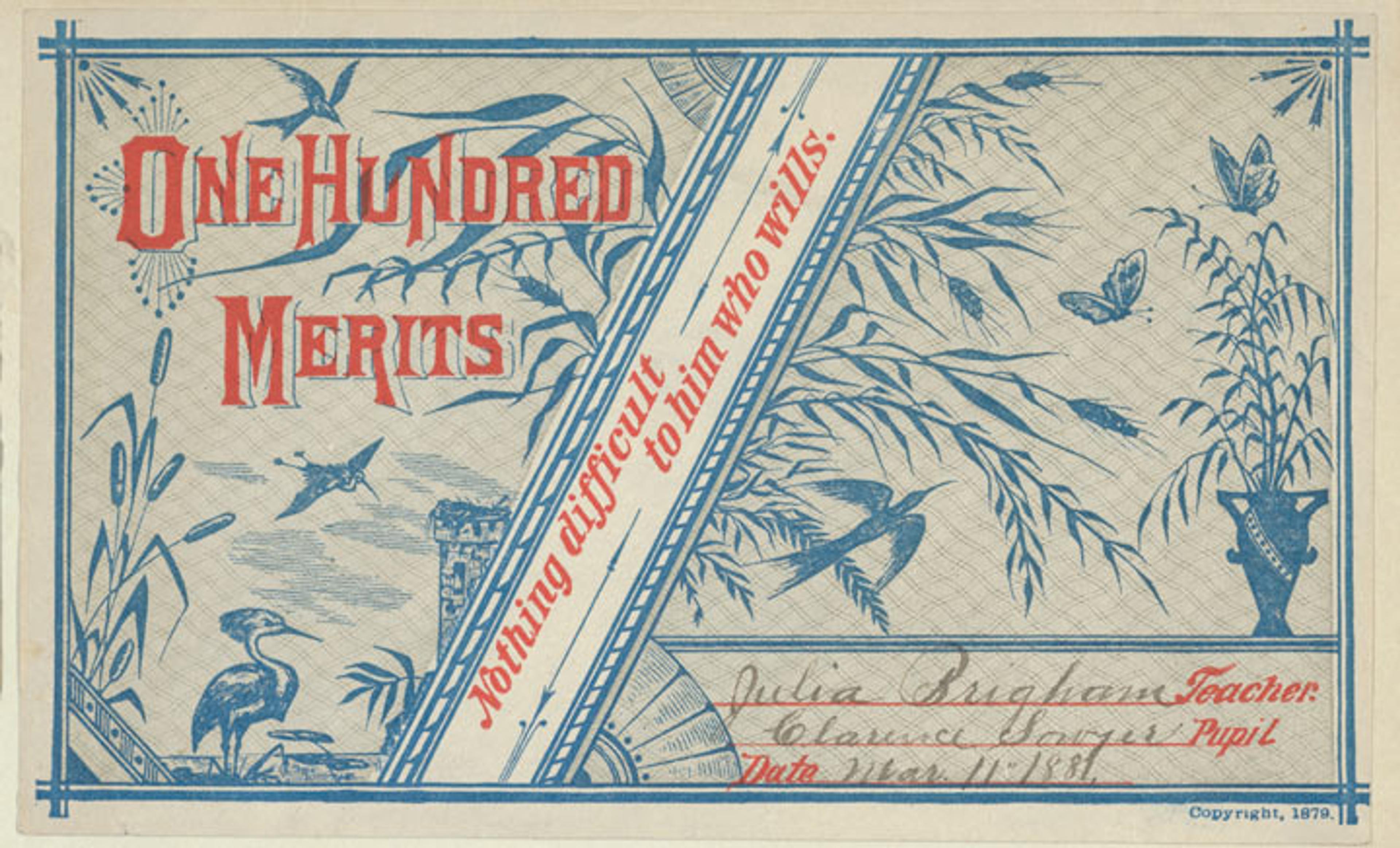
Anonymous, American, 19th century. One Hundred Merits, 1879. Lithograph; Sheet: 3 7/8 x 6 1/4 in. (9.8 x 15.8 cm). The Metropolitan Museum of Art, New York, The Jefferson R. Burdick Collection, Gift of Jefferson R. Burdick (Burdick 540, p.126r[1])
«The quest for favorable acknowledgment was alive and well in early American schoolhouses. Almost a precursor to the "Like" button on social media, Reward of Merit cards were popular paper tokens in many classrooms. While promotional inserts for goods and services dominate the Jefferson R. Burdick Collection, a lesser-known portion of his ephemera trove is the Reward of Merit cards contained in albums 540, 541, and 542.»
Developed in America during the late 18th century, these cards—initially handmade and then later printed and sold in sets—were given by teachers to students who demonstrated good behavior and deserved recognition. Most cards consisted of imagery, specified good deeds, and provided blank lines for inscribing the names of both student and teacher. With hundreds of designs offered for weekly assessments by teachers, they were ripe for collecting. The cards frequently featured subject matter unrelated to learning or good behavior, as in this series of bird species.
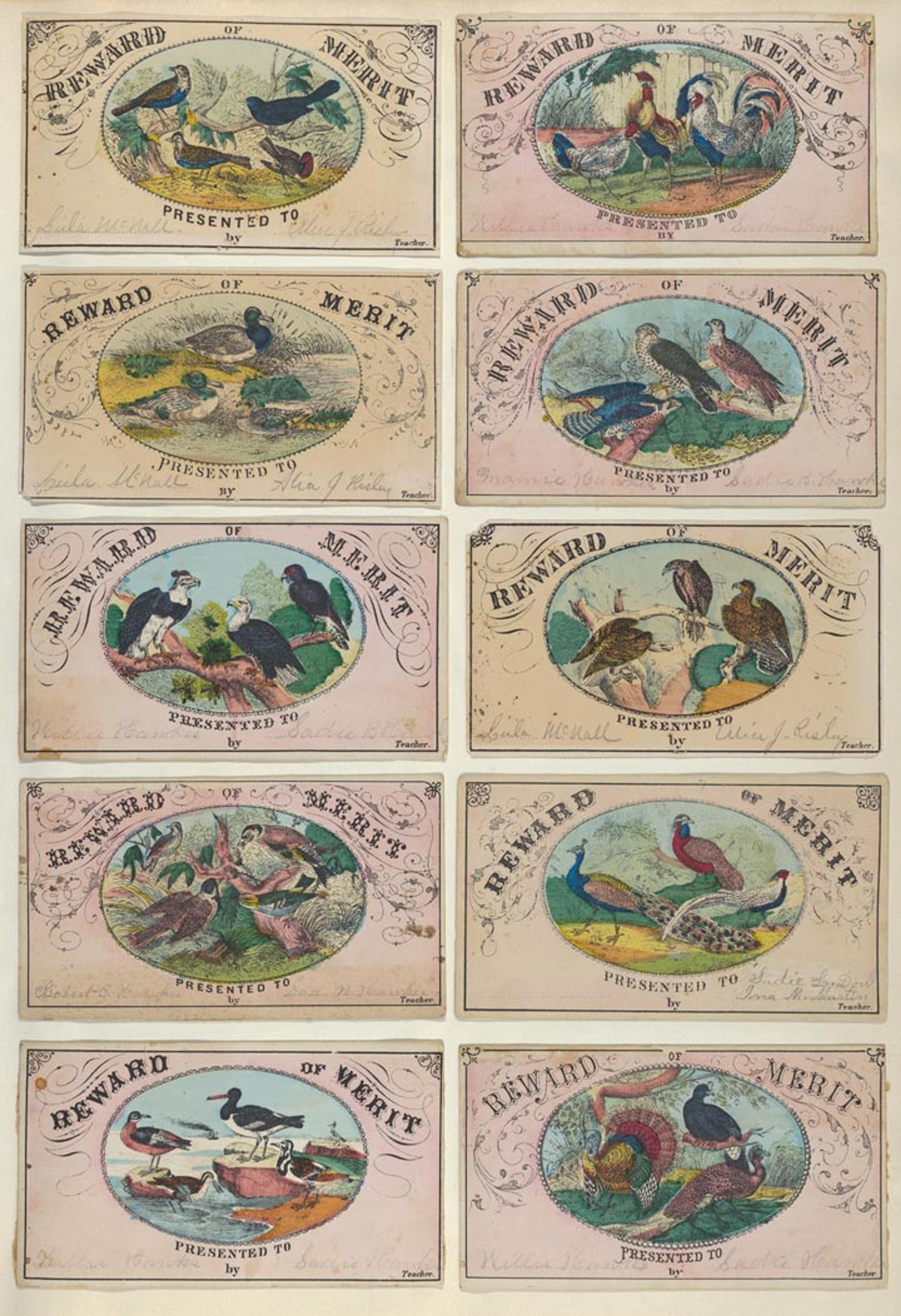
Anonymous, American, 19th century. Reward of Merit cards depicting birds, 19th century. Hand colored lithograph; Sheet: 14 15/16 x 12 1/2 in. (38 x 31.8 cm). The Metropolitan Museum of Art, New York, The Jefferson R. Burdick Collection, Gift of Jefferson R. Burdick (Burdick 540, p.69r)
Designs ranged from the elaborate portraits of notable Americans adorned with fruits and flowers to the straightforward praise offered for not whispering while in class.
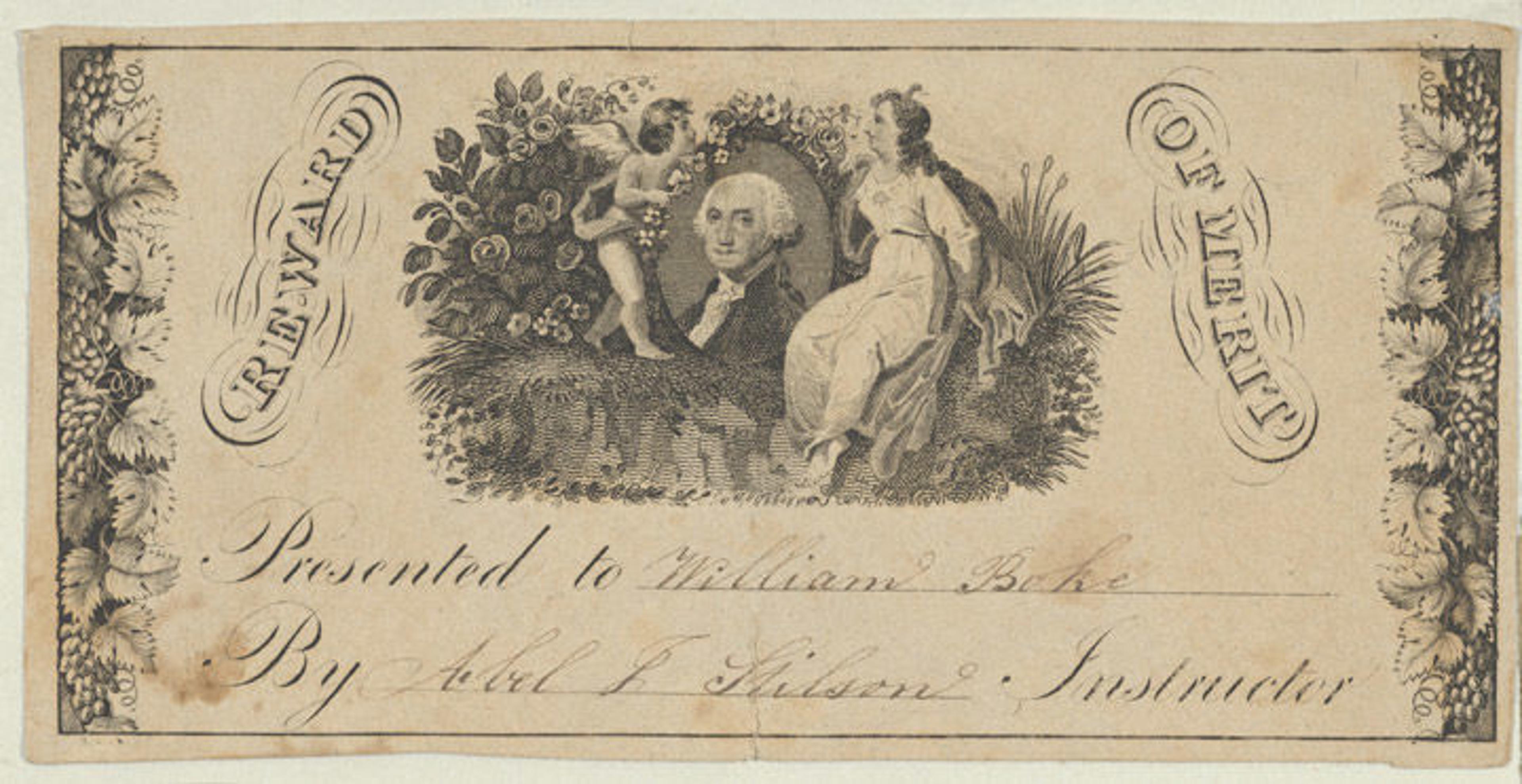
Anonymous, American, 19th century. Reward of Merit card with portrait of George Washington. Engraving; Sheet: 2 1/2 in. x 5 in. (6.3 x 12.7 cm). The Metropolitan Museum of Art, New York, The Jefferson R. Burdick Collection, Gift of Jefferson R. Burdick (Burdick 540, p.85r[3])
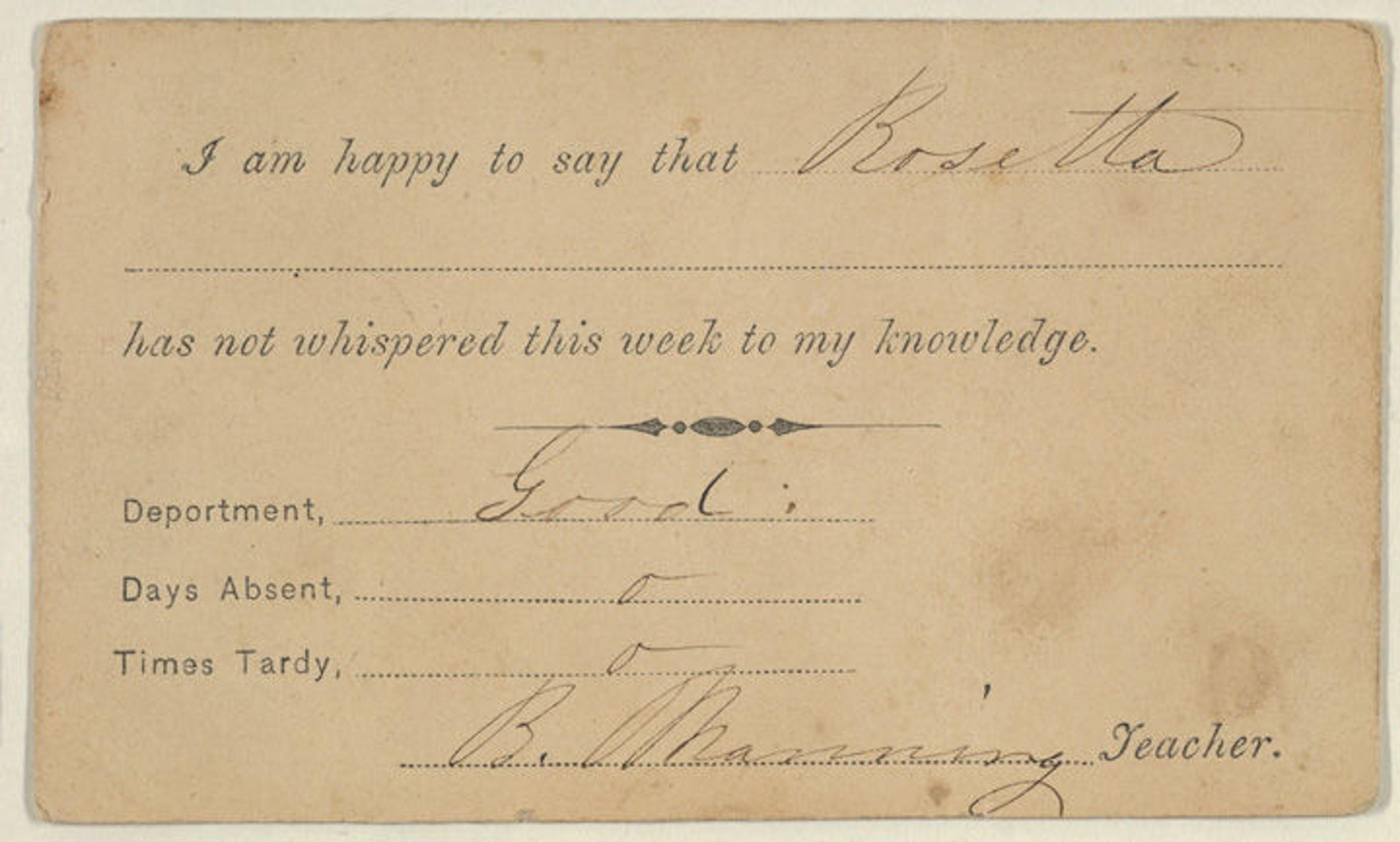
Anonymous, American, 19th century. Reward of Merit. Lithograph; Sheet: 1 15/16 x 3 1/4 in. (4.9 x 8.3 cm). The Metropolitan Museum of Art, New York, The Jefferson R. Burdick Collection, Gift of Jefferson R. Burdick (Burdick 540, p.121r[20])
The Good and Bad Boys card makes its moralistic message glaringly clear: on the left side, boys disrupt a bird's nest; on the right, studious boys read while walking to Sunday school.
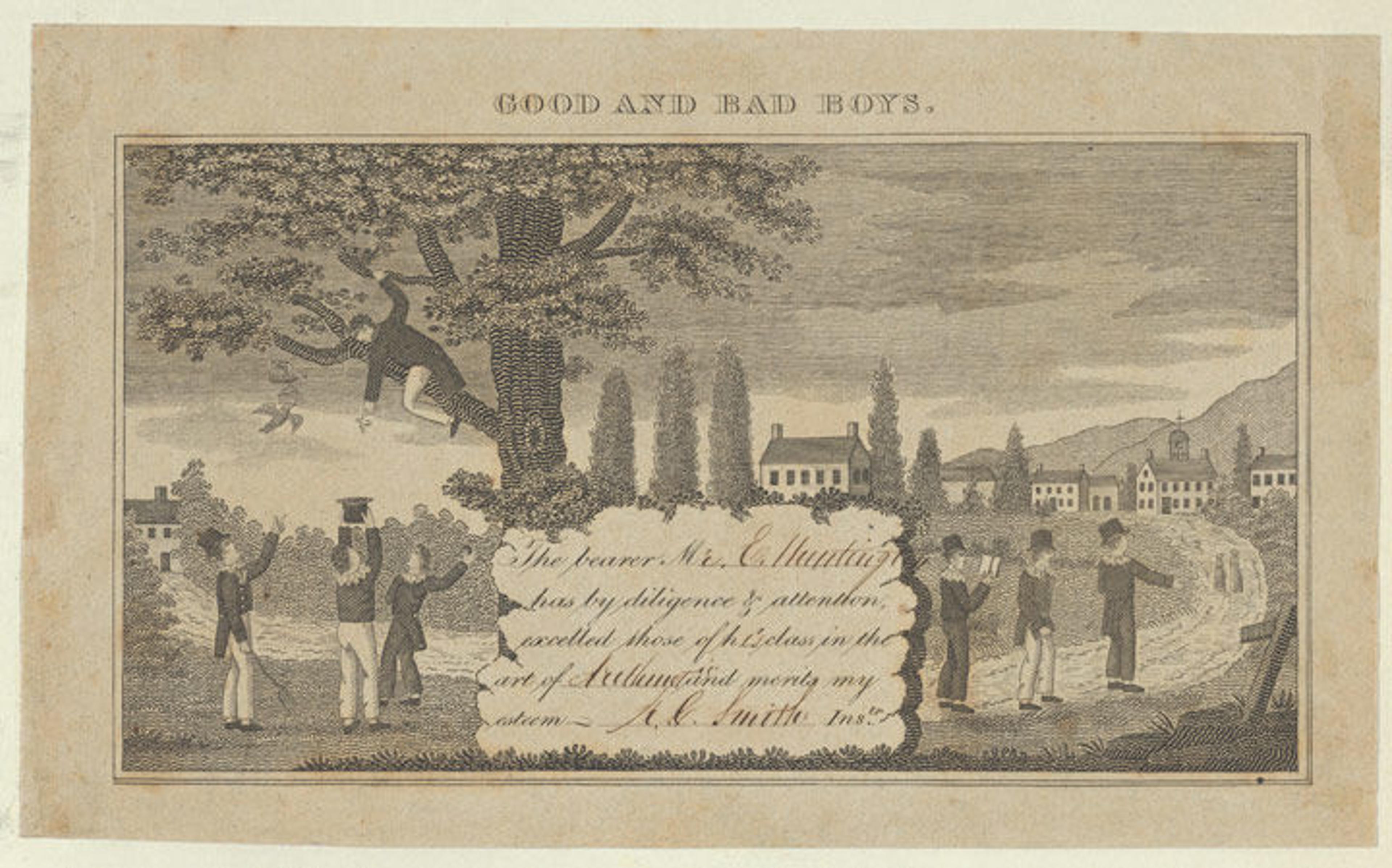
Anonymous, American, 19th century. Good and Bad Boys. Engraving; Sheet: 4 1/8 x 6 3/4 in. (10.4 x 17.2 cm). The Metropolitan Museum of Art, New York, The Jefferson R. Burdick Collection, Gift of Jefferson R. Burdick (Burdick 540, p.19r[4])
By contrast, as in this instance, virtuous messages like "Shun Bad Boys" and "Love Your Book" were nestled in ornamental borders. Cards compared a knowledgeable mind to a well-stocked safe and others mimicked currency.
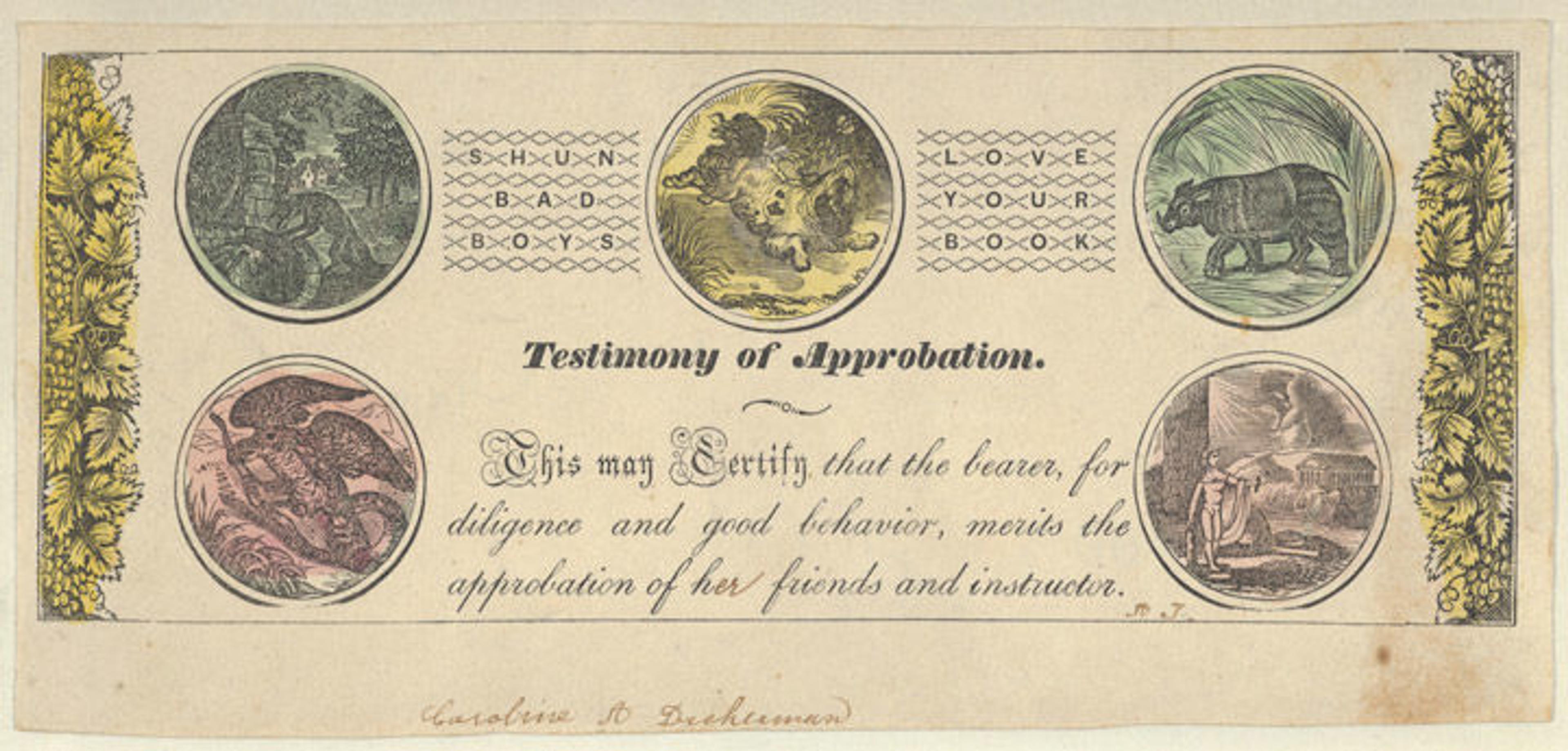
Anonymous, American, 19th century. Testimony of Approbation. Hand colored engraving with letterpress; Sheet: 2 13/16 x 6 1/16 in. (7.2 x 15.4 cm). The Metropolitan Museum of Art, New York, The Jefferson R. Burdick Collection, Gift of Jefferson R. Burdick (Burdick 540, p.39r[1])
Not only is this card worth "60 merits," guaranteeing "Labor has a sure reward," but it playfully suggests future earning potential. Some simply encouraged students to "Try Again."
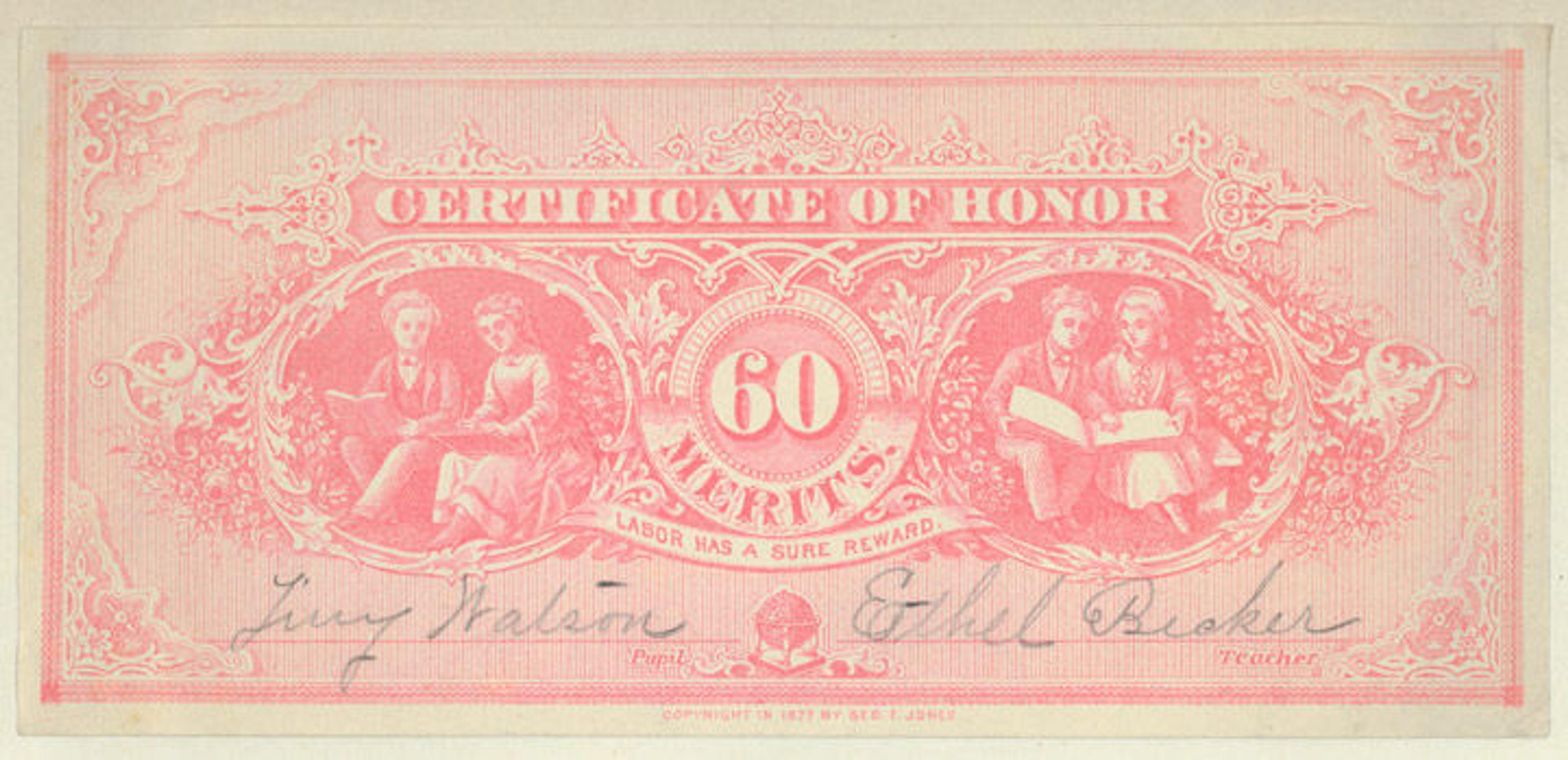
Geo. F. Jones (American, 19th century). Certificate of Honor, 1877. Lithograph; Sheet: 2 3/4 x 5 15/16 in. (7 x 15.1 cm). The Metropolitan Museum of Art, New York, The Jefferson R. Burdick Collection, Gift of Jefferson R. Burdick (Burdick 540, p.104r[1])
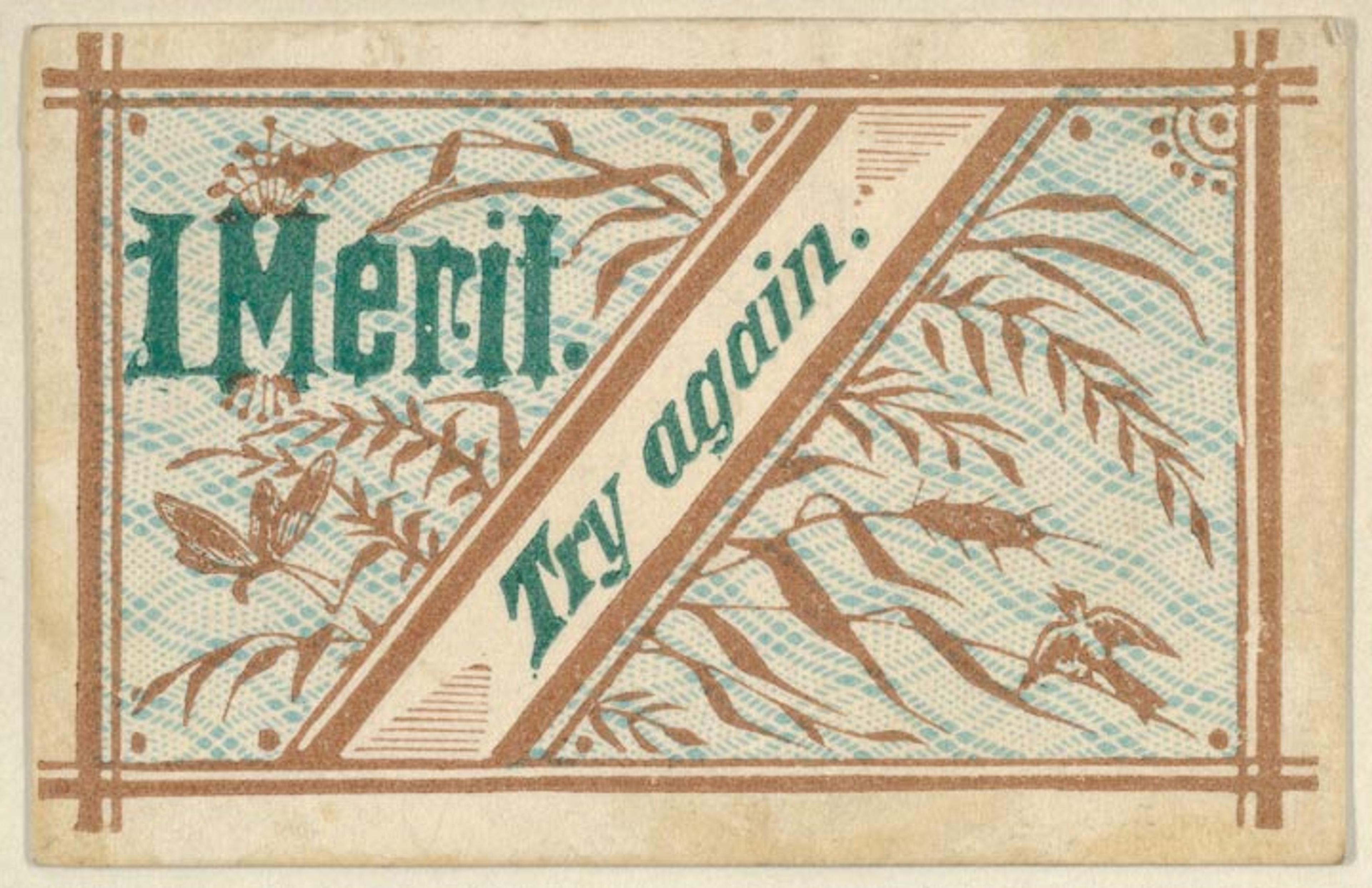
Anonymous, American, 19th century. Try Again. Lithograph; Sheet: 1 5/16 x 2 1/16 in. (3.4 x 5.2 cm). The Metropolitan Museum of Art, New York, The Jefferson R. Burdick Collection, Gift of Jefferson R. Burdick (Burdick 540, p.128r[3])
Paired with scenes of pensive and working children were bold phrases of empowerment such as "Never Say 'Can't'" and "Knowledge Is Power." "Thou Shalt Not Kill" was likely given at a Sunday school, where collecting the Ten Commandments could also reinforce lessons.
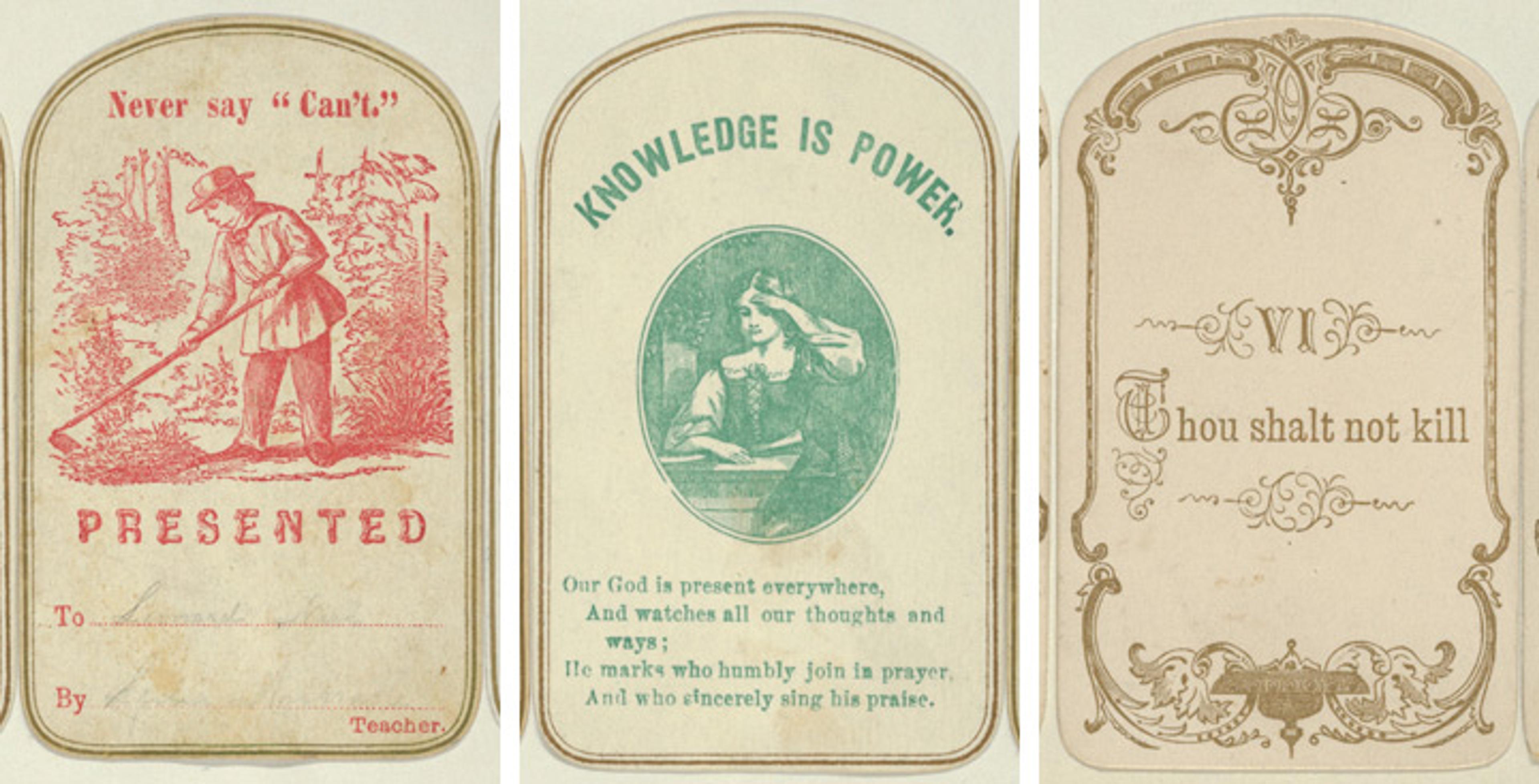
Left to right: Anonymous, American, 19th century. Never Say "Can't." Lithograph; Sheet: 3 3/8 x 2 1/8 in. (8.5 x 5.4 cm). The Metropolitan Museum of Art, New York, The Jefferson R. Burdick Collection, Gift of Jefferson R. Burdick (Burdick 540, p.113r[4]). Anonymous, American, 19th century. Knowledge Is Power. Lithograph; Sheet: 3 3/8 x 2 1/16 in. (8.5 x 5.3 cm). The Metropolitan Museum of Art, New York, The Jefferson R. Burdick Collection, Gift of Jefferson R. Burdick (Burdick 540, p.113r[13]). Anonymous, American, 19th century. Thou Shalt Not Kill. Lithograph; Sheet: 3 1/4 in. x 2 in. (8.3 x 5.1 cm). The Metropolitan Museum of Art, New York, The Jefferson R. Burdick Collection, Gift of Jefferson R. Burdick (Burdick 540, p.124r[11])
Even in this letterpress sheet of uncut merit cards that alternate between "A Good Boy" and "A Good Girl," there is enough variation in font to make each version desirable.
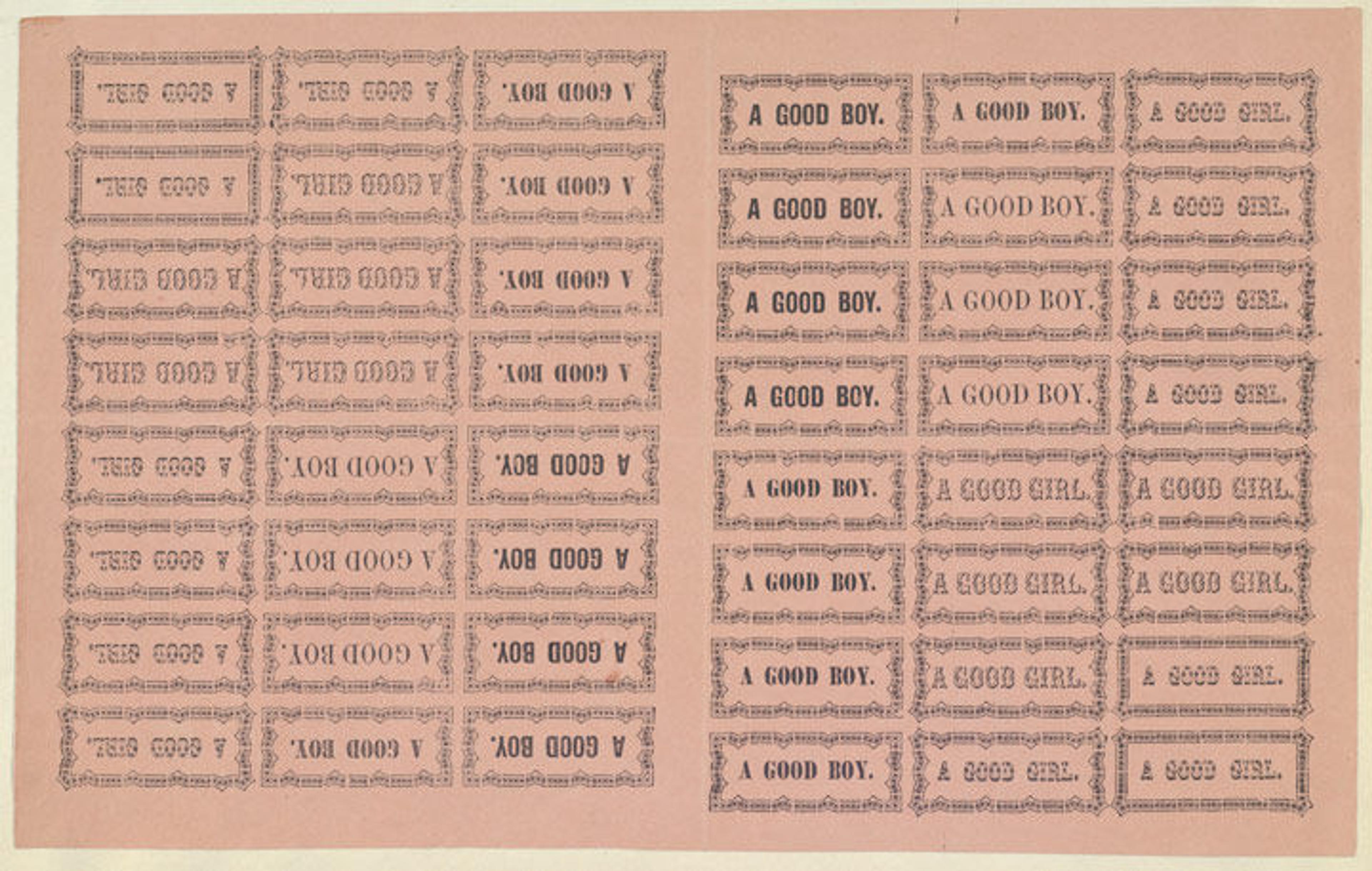
Anonymous, American, 19th century. Sheet of Reward of Merit cards. Letterpress; Sheet: 6 1/4 x 9 15/16 in. (15.9 x 25.2 cm). The Metropolitan Museum of Art, New York, The Jefferson R. Burdick Collection, Gift of Jefferson R. Burdick (Burdick 540, p.127r[14])
The development of the Reward of Merit cards coincided with the origins of commercial printing in America, and this selection coincides with the end of another school year. In the spirit of these cards, The Met offers 305,000 merits for Jefferson Burdick for his diligence and forethought as we make frequent drafts upon his collection's riches.
Related Links
The Jefferson R. Burdick Collection of Printed Ephemera
Now at The Met: Blog posts related to the Jefferson R. Burdick Collection of Printed Ephemera
Liz Zanis
Liz Zanis is a collections specialist in the Department of Drawings and Prints.